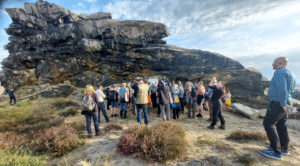
Membership
INQUA, the International Union for Quaternary Research, is the global representative body for Quaternary science. Its members form a crucial network that helps promote INQUA’s mission.
Any country or geographic region can become a member of INQUA by joining through its National Academy, National Research Council, or a similar institution. If a national association doesn’t exist, a group of scientific institutions or societies can form to apply for membership. Please note that INQUA membership is not available to individual persons.
There are two categories of INQUA membership
Full Member
- National Member: a country that pays the yearly membership fee to INQUA. The country is entitled to send one voting Delegate and one Observer to the INQUA International Council Meetings.
- Regional Member: a group of three or more affiliated countries that pay the yearly INQUA membership fee together. The group is entitled to send one voting Delegate and one Observer to the INQUA International Council Meetings.
Associate Member
- Associate member: a country or a regional group of three or more affiliated countries that do not pay the Membership fees. Associate Members have limited rights. They can send delegates to the International Council Meetings but do not have voting rights.
Applications for INQUA Membership should be sent to the INQUA Secretary-General, Prof. Dr. Enikö Magyari, info@inqua.org. The application should include the name, affiliation, and contact details of the formal representative of the country or regional group.
Membership Fee
There are six levels of annual Membership Fees:
Level 1: Euros 16405; Level II: Euros 8200; Level III: Euros: 5740; Level IV: Euros 4100; Level V: 2460; and Level VI: 820.
The membership level is based on the country’s GDP and carries equal rights.
Benefits of Becoming an INQUA Member
Full Members have the right
- to nominate and elect the officers of the INQUA Executive
- to approve the nomination of the INQUA Commission Officers
- to offer a bid to organize an INQUA Congress that takes place every four years
- to propose new INQUA Commissions
- to propose any (major) change in the organisation of the INQUA Association.
A large part of the INQUA resources are used to fund (i) INQUA International Research Network (IRN) Grants (ii) INQUA Fellowships (iii) INQUA Congress Support. Regarding an IRN Grant application, at least one of the leaders should be from a Full Member country.
INQUA supports the International Quaternary Research Community by offering scholars to publish their scientific results in one of the two jointly owned Elsevier/INQUA journals, Quaternary International (QI) and Quaternary Environments and Humans (QEH).
INQUA is a full member of the International Science Council (ISC) and is part of the ISC-Geo Unions network. The organization maintains strong working relationships with several other organizations that have overlapping goals, such as PAGES and IUBS. These collaborations provide benefits to members through various programs, including joint workshops and conferences for early career researchers.
Latest developments
View moreLatest developments International Summer School 2026 – Climate change in coastal areas: hot topics, future projections, impacts
International Summer School 2026 – Climate change in coastal areas: hot topics, future projections, impactsInternational Summer School 2026 – Climate change in coastal areas: hot topics, future projections, impacts 3-6 June 2026, Venice (Italy)
 Loess Fest 2026
Loess Fest 2026Echoes of the past: Loess, climate and human interactions during the Pleistocene will take place between 7-11 September in Krapets, Bulgaria
 Podcast INQUA India 2027
Podcast INQUA India 2027Quaternary is the age when modern recognisable humans started inhabiting this planet. All over the world scientists are engaged in studying various aspects of human evolution. Once every 4 years scientists from all across the…
 PALCOM-supported sessions
PALCOM-supported sessionsINQUA PALCOM interactive bulletin of scientific sessions for the INQUA Congress 2027
 New QP Issue Out!
New QP Issue Out!QP Issue 39 December 2025 is now available online!
 INQUA 2025 Sir Nicholas Shackleton Medal
INQUA 2025 Sir Nicholas Shackleton MedalThe INQUA 2025 Sir Nicholas Shackleton Medal recipient is Prof. Dr. Nicole Khan from the University of Hong Kong (Hong Kong)



